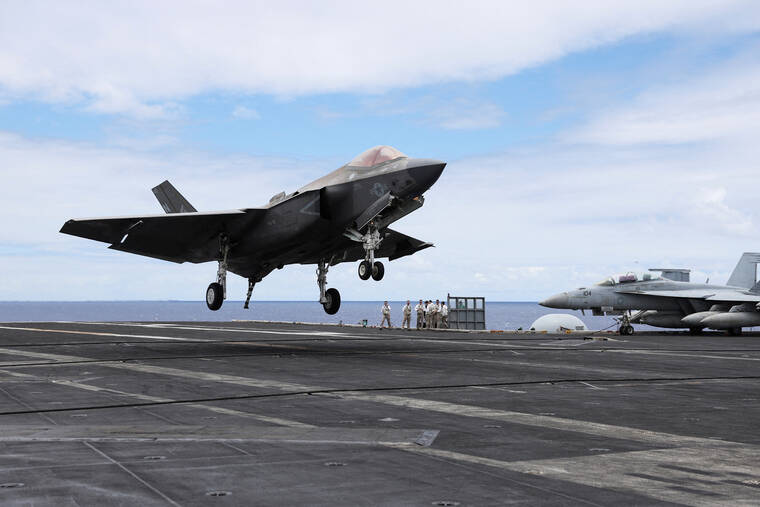
News
September 06, 2025
Trump downplays regime change talk as U.S. sends F-35 jets near Venezuela
WASHINGTON >> The United States is not talking about regime change in Venezuela, President Donald Trump said today, as the United States ordered an additional 10 stealth fighter jets to a growing military buildup in the Caribbean.
President Donald Trump asserted today that the United States is not currently pursuing regime change in Venezuela, despite escalating tensions and a growing U.S. military presence in the Caribbean region. The statement comes as the U.S. authorized the deployment of ten additional F-35 stealth fighter jets to the area, adding to an already significant military buildup.
The deployment of the advanced fighter jets signals a heightened level of concern from the U.S. regarding the situation in Venezuela. While President Trump downplayed the notion of direct intervention aimed at removing the current Venezuelan government, the increased military presence serves as a clear demonstration of U.S. power and influence in the region.
The reasons behind the buildup remain somewhat unclear, though analysts speculate that it could be a response to a number of factors. These include ongoing concerns about the humanitarian crisis in Venezuela, the flow of refugees into neighboring countries, and the alleged presence of foreign actors with potentially destabilizing intentions.
The situation in Venezuela has been deteriorating for years, marked by economic hardship, political instability, and widespread human rights concerns. The U.S. has consistently called for free and fair elections and a return to democratic principles.
The deployment of F-35s is a significant escalation compared to previous U.S. actions. These advanced aircraft represent a cutting-edge military capability, capable of operating in contested airspace and providing a significant deterrent. The move is likely to be interpreted by the Venezuelan government as a sign of increased pressure and a potential threat to its sovereignty.
While President Trump's statement attempts to reassure that the U.S. isn't actively seeking regime change, the simultaneous deployment of sophisticated military hardware paints a more complex picture. The U.S. appears to be walking a tightrope, balancing the need to address the crisis in Venezuela with the desire to avoid direct military intervention and further destabilization of the region. The coming days and weeks will be crucial in determining the future course of U.S. policy towards Venezuela and the impact of this latest military deployment.
The deployment of the advanced fighter jets signals a heightened level of concern from the U.S. regarding the situation in Venezuela. While President Trump downplayed the notion of direct intervention aimed at removing the current Venezuelan government, the increased military presence serves as a clear demonstration of U.S. power and influence in the region.
The reasons behind the buildup remain somewhat unclear, though analysts speculate that it could be a response to a number of factors. These include ongoing concerns about the humanitarian crisis in Venezuela, the flow of refugees into neighboring countries, and the alleged presence of foreign actors with potentially destabilizing intentions.
The situation in Venezuela has been deteriorating for years, marked by economic hardship, political instability, and widespread human rights concerns. The U.S. has consistently called for free and fair elections and a return to democratic principles.
The deployment of F-35s is a significant escalation compared to previous U.S. actions. These advanced aircraft represent a cutting-edge military capability, capable of operating in contested airspace and providing a significant deterrent. The move is likely to be interpreted by the Venezuelan government as a sign of increased pressure and a potential threat to its sovereignty.
While President Trump's statement attempts to reassure that the U.S. isn't actively seeking regime change, the simultaneous deployment of sophisticated military hardware paints a more complex picture. The U.S. appears to be walking a tightrope, balancing the need to address the crisis in Venezuela with the desire to avoid direct military intervention and further destabilization of the region. The coming days and weeks will be crucial in determining the future course of U.S. policy towards Venezuela and the impact of this latest military deployment.
Category:
Politics